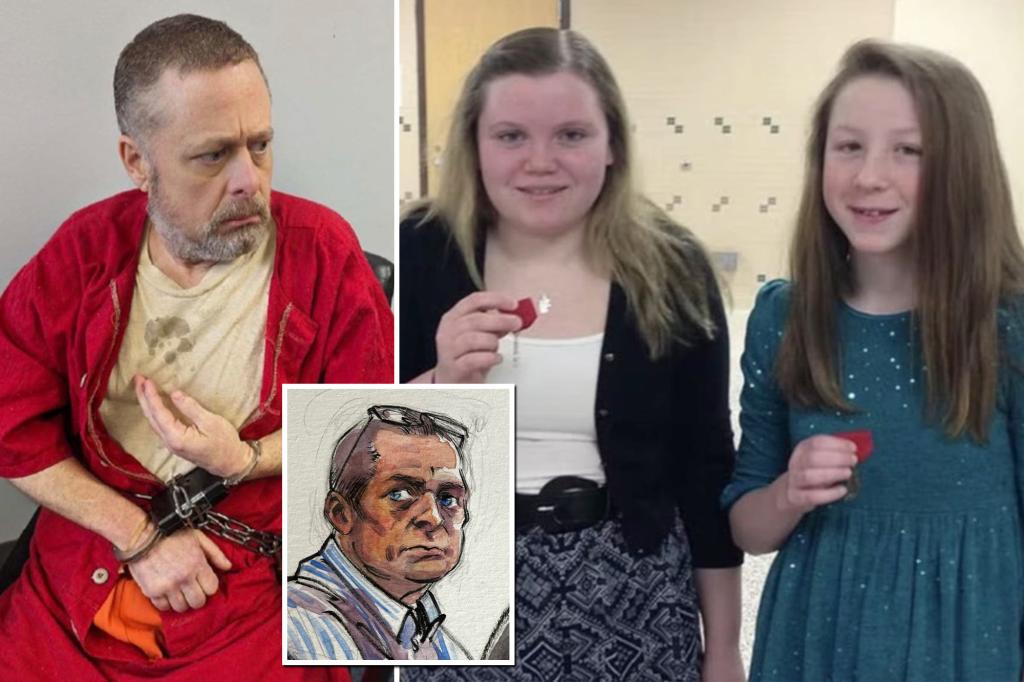The tranquil town of Delphi, Indiana, was irrevocably shattered on a February afternoon in 2017 when two young lives were cruelly extinguished. Abigail Williams, 13, and Liberty German, 14, two inseparable friends, ventured out onto the Monon High Bridge Trail, a seemingly idyllic setting for an afternoon stroll. Their innocent outing turned into a nightmare when they encountered Richard Allen, a 50-year-old local resident and CVS pharmacy technician. Allen, armed and menacing, forced the girls off the trail, their carefree laughter replaced by terror. He initially intended to sexually assault them but was deterred by a passing van, a momentary reprieve that ultimately proved futile. Driven by a dark and incomprehensible impulse, Allen marched the girls down a hill, a quarter-mile away from the trail, and brutally murdered them, slitting their throats. The discovery of their bodies the next day plunged Delphi into a state of shock and grief, the idyllic façade of the small town ripped away by the horrific act of violence.
The murders of Abigail and Liberty initiated a complex and agonizingly long investigation that would haunt Delphi for nearly six years. The case, initially hampered by a lack of solid leads, became a focal point for both local and national law enforcement. The limited evidence gathered at the crime scene, coupled with grainy images and a snippet of audio captured on Liberty German’s phone, tantalizingly hinted at the perpetrator’s identity but remained frustratingly elusive. The image of a man in a blue jacket walking on the bridge, along with the chilling audio of a male voice saying “down the hill,” became synonymous with the case, plastered on news reports and social media, a constant reminder of the unanswered questions that plagued the community. Years passed, marked by countless tips, numerous suspects investigated, and the agonizing wait for justice for Abigail and Liberty.
The breakthrough finally came in October 2022, a moment of both relief and renewed anguish for Delphi. Richard Allen, the seemingly unassuming local pharmacist, was arrested and charged with the double murder. The news sent shockwaves through the community, disbelief mingling with a sense of vindication. While the details of the evidence that led to Allen’s arrest were initially kept under wraps, it was revealed that investigators had meticulously pieced together a case based on a combination of eyewitness testimony, forensic analysis, and Allen’s own confession. A .40 caliber unspent round found near the girls’ bodies was linked to a gun belonging to Allen, solidifying his connection to the crime scene. While the motive remained shrouded in mystery, the arrest provided a glimmer of hope for closure after years of uncertainty and grief.
The subsequent trial, held in February 2024, captivated the nation. The prosecution presented a compelling case, weaving together the circumstantial evidence and Allen’s confession to paint a picture of a calculated and brutal crime. The defense, however, argued that the confession was coerced and that the evidence was insufficient to definitively link Allen to the murders. Despite these arguments, the jury ultimately found Allen guilty on two counts of murder, a verdict that resonated with a collective sigh of relief across Delphi and beyond. The guilty verdict, though bringing some closure, also marked the beginning of a new chapter in the town’s journey, one focused on healing and remembrance.
On April 28, 2024, Richard Allen was sentenced to two consecutive life sentences without the possibility of parole, the maximum penalty allowed by Indiana law. The sentencing hearing provided a platform for the families of Abigail and Liberty to express their profound grief and the devastating impact of the murders on their lives. Their words, filled with both sorrow and strength, resonated with the courtroom and served as a powerful testament to the enduring love and memory of the two girls. The judge, in delivering the sentence, acknowledged the heinous nature of the crime and the irreparable damage it had inflicted on the community. The sentence, while providing a legal resolution to the case, could never truly fill the void left by the loss of Abigail and Liberty.
The story of the Delphi murders serves as a stark reminder of the darkness that can lurk beneath the surface of even the most idyllic communities. It is a story of loss, grief, and the arduous pursuit of justice. While the sentencing of Richard Allen brings a sense of closure, the scars of this tragedy will undoubtedly remain on Delphi for years to come. The memory of Abigail and Liberty, however, will continue to live on, not only as victims of a horrific crime, but as symbols of the resilience and strength of a community grappling with unimaginable loss. Their legacy, forever intertwined with the tragedy that befell them, will serve as a reminder of the importance of cherishing life and the enduring power of hope in the face of darkness.

